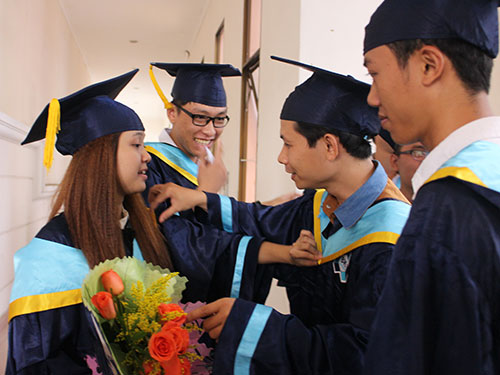Many university graduates ill-prepared for job market
A survey of 3,000 former students has found that the knowledge received at university is not useful for future jobs.
The survey was conducted by the Policy Research and Analysis Center, an arm of the Ha Noi University of Social Sciences and Humanities.
The students surveyed were graduates of Ha Noi and HCM City National universities, and Hue University from 2006 to 2010.
About 26 percent of bachelor degree graduates said they had not found a job in any field, including their major.
Of the jobless graduates, 46.5 percent said they had been looking for jobs, while 42 percent continued higher education as a solution to “avoid” unemployment.
Twenty-seven percent of those with bachelor’s degrees said it was difficult to find jobs because their majors were not in high demand, while 18 percent said employers did not understand their majors.
The figures show two serious problems. First, education quality is so low that only one-fourth of graduates cannot find jobs within one to five years since the day they finished school.
 |
Second, there are problems in training curricula. The graduates, after four to five years of studying, still cannot satisfy requirements set by employers.
The knowledge they receive at school has not been useful in their jobs, and they do not have the knowledge employers want.
The director of a joint venture said that in general it takes about four years for a university graduate to adapt to his work after four years of working.
It takes the director about two years to clear away the knowledge they had received at school, and another two years for the employee to practice the necessary skills.
University mission
The research team has called on universities to rethink their mission, and why they exist. The mission directs and determines the school activities and the ways the school needs to follow to reach goals.
Under the 2006-2020 national program on Viet Nam’s university education reform, 70-80 percent of all students will study applied sciences.
This means that only a few schools will focus on research activities and produce scientists. The schools will gather the most talented students in different majors and train university lecturers with doctorates for the higher education system.
Meanwhile, the key task of the remaining schools is to produce a labor force capable of working in different fields.
As such, the mission of most universities is providing students with knowledge and skills necessary for their future jobs.
While research-oriented schools will need heavy investment from the state budget, the applied science-based schools will instead develop on the basis of cooperation programs with businesses.